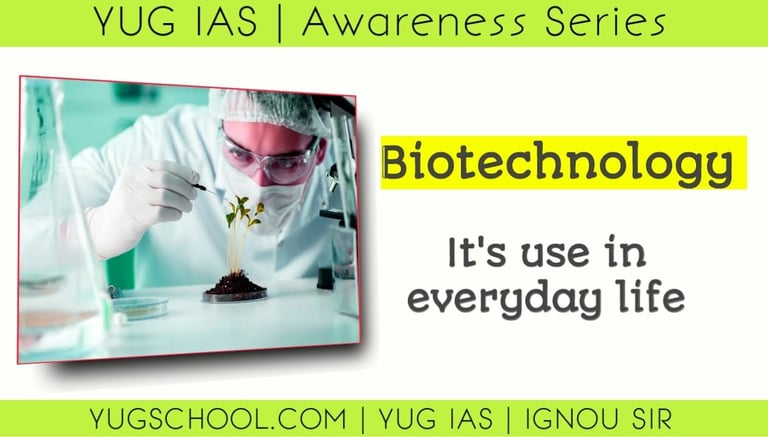Biotechnology and its use in everyday life
Biotechnology plays a significant role in shaping our daily lives, influencing various aspects from healthcare and food production to environmental sustainability and industrial processes.
GENERAL STUDIES 3


is a broad field that encompasses the use of living organisms, their parts, and processes to develop new products and technologies. It's a powerful tool that has significantly impacted our daily lives in various ways, often in ways we might not even realize. Here are some prominent examples of how biotechnology is used in our everyday lives:
Healthcare:
Medicine and vaccines: Many life-saving medicines and vaccines, such as insulin for diabetes and vaccines for various infectious diseases, are produced using biotechnology.
Diagnostics: Advanced diagnostic tests, like those used for pregnancy detection or genetic testing, rely on techniques derived from biotechnology.
Treatments: Novel treatments like gene therapy and immunotherapy, which hold immense potential for treating various diseases, are rooted in biotechnology.
Food and Agriculture:
Genetically modified crops (GMOs): These crops are engineered to possess desirable traits like resistance to pests, herbicides, or drought, leading to increased food production and improved food security.
Food processing: Enzymes and other biomolecules are used in various food processing applications, such as cheesemaking, yogurt production, and bread making.
Biofertilizers and biopesticides: These eco-friendly alternatives to chemical fertilizers and pesticides are gaining traction due to their effectiveness and reduced environmental impact.
Industry and Environment:
Biofuels: Renewable fuels like ethanol and biodiesel are produced from plant materials using fermentation processes, offering a sustainable alternative to fossil fuels.
Bioremediation: Microorganisms are employed to clean up contaminated environments, such as oil spills or polluted water bodies.
Biodegradable materials: The development of biodegradable plastics and other materials derived from renewable sources helps address plastic pollution concerns.
Other Applications:
Biocosmetics: Many personal care products, such as lotions, shampoos, and cosmetics, utilize ingredients derived from biological sources or produced using biotechnologies.
Bioenergy: Microorganisms are used to generate electricity through a process known as bioconversion, contributing to renewable energy production.
Textiles: Bio-based fibers like bamboo and hemp are increasingly used in clothing production due to their sustainability and desirable properties.
In conclusion, biotechnology plays a significant role in shaping our daily lives, influencing various aspects from healthcare and food production to environmental sustainability and industrial processes. As the field continues to advance, we can expect even more innovative and impactful applications to emerge in the future.
